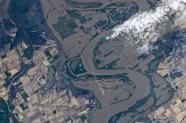Louisiana to Open Spillway
Army engineers prepared Saturday to slowly open the gates of an emergency spillway along the rising Mississippi River, diverting floodwaters from Baton Rouge and New Orleans, yet inundating homes and farms in parts of Louisiana's populated Cajun country.
About 25,000 people and 11,000 structures could be in harm's way when the Morganza spillway is unlocked for the first time in 38 years. Sheriffs and National Guardsmen were warning people in a door-to-door sweep through the area, and shelters were ready to accept up to 4,800 evacuees, Gov. Bobby Jindal said.
Some people living in the threatened stretch of countryside — an area known for small farms, fish camps and a drawling French dialect — have already started fleeing for higher ground.
"Now's the time to evacuate," Jindal said. "Now's the time for our people to execute their plans. That water's coming."
Opening the spillway will release a torrent that could submerge about 3,000 square miles under as much as 25 feet of water in some areas but take the pressure off the downstream levees protecting New Orleans, Baton Rouge and the numerous oil refineries and chemical plants along the lower reaches of the Mississippi.
"Protecting lives is the No. 1 priority," Army Corps of Engineers Maj. Gen. Michael Walsh said at a news conference aboard a vessel on the river at Vicksburg. A few hours later, the corps made the decision to open the key spillway and inundate thousands of homes and farms in Louisiana's Cajun country to avert a potentially bigger disaster in Baton Rouge and New Orleans.
Engineers feared that weeks of pressure on the levees could cause them to fail, swamping New Orleans under as much as 20 feet of water in a disaster that would have been much worse than Hurricane Katrina in 2005.
Instead, the water will flow 20 miles south into the Atchafalaya Basin. From there it will roll on to Morgan City, an oil-and-seafood hub and a community of 12,000, and eventually into the Gulf of Mexico, flooding swamps and croplands.


